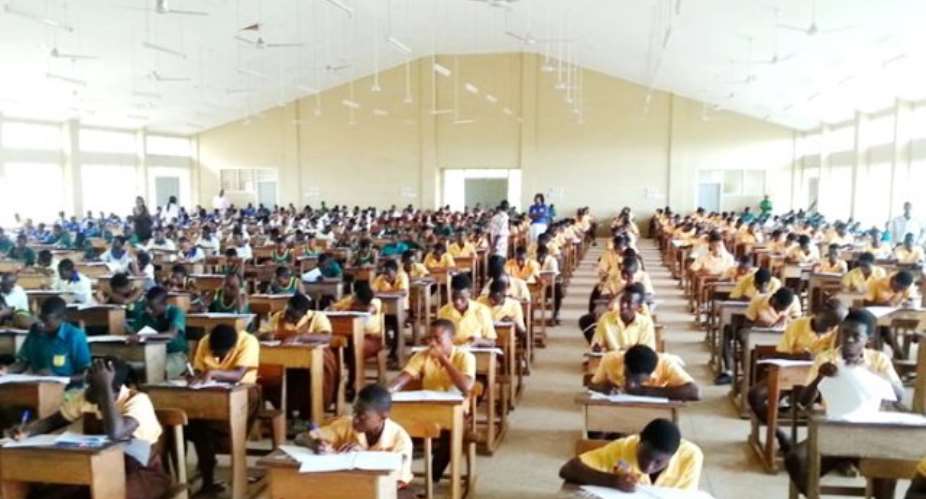It appears the continuous appalling standards of basic education in the Northern region has become an issue of concern to the Ghana Education Service (GES).
For quite some time now, the Northern region has been recording extremely low performances at the Basic Education Certificate Examination (BECE).
It against this background that the Northern Regional Examinations Officer of Ghana Education Service (GES), Reverend Kofi Amofa Odaatu is worried about this development.
He said for the past ten years, public basic schools in the Northern Region with North East and Savannah Regions inclusive, have not performed up to 50 per cent pass rate in the BECE.
The persistent poor performance was blamed on early registration of students, wholesale promotion, inadequate supervision, insufficient parental control and growing indiscipline on the part of students, teachers and parents.
Rev Odaatu made this known during a presentation on BECE performance from 2014 to 2018 at a stakeholder accountability forum on education on Monday in Tamale.
The meeting was organized by Youth Empowerment for Life (YEfL) in collaboration with the Northern Regional Youth Network and funded by OXFAM.
Students, youth networks and groups, staff of GES and several other stakeholders participated in the session that aimed at eliciting ideas on how to help improve falling standards of education in the Northern Region.
From 2014 to 2018, the Region performed below the national average, recording 19.56 per cent pass in 2015 and 37.24 per cent pass in 2018, as the lowest and highest performance within the periods.
According to the statistics presented by Rev Odaatu, in 2015, out of 36,536 students who sat for the examination, only 7,147, representing, 19.56 per cent passed within aggregate 6 to 30.
In 2018, with 42,623 students who sat for the BECE, only 15,874 representing 37.24 per cent passed within aggregate 6 to 30.
Rev Odaatu urged parents to help monitor their children’s education, ensure improved supervision and provide capacity building support for staff and establish effective collaboration with stakeholders.
Alhaji Mohammed Seidu Issah Abah, the Regional Deputy Director of GES in charge of Human Resource Management and Development, said strategic monitoring systems were being put in place to help improve education quality and performance in schools.
He urged headmasters, teachers, and District Education Directorates to effectively perform their duties in accordance with the dictates of the national and district Annual District Operational Plans (ADOPs).
He urged parents to be responsible for monitoring their children’s education and encouraged the school children to be disciplined and committed to their studies.
Madam Jawol Vera Magan, the YEfL called for collective efforts to help beef up the quality of education, invest and safeguard the future of Ghanaian children.
She said young people who lacked literacy were generally likely to make bad decisions and also become irresponsible in the future.
The participants advised students to change their attitude towards studies and urged parents and teachers among other stakeholders to help monitor activities of students in a bid to curb falling standards of education in the regions.
---Ghana News Agency





 Saglemi Housing Project will not be left to rot – Kojo Oppong Nkrumah
Saglemi Housing Project will not be left to rot – Kojo Oppong Nkrumah
 Transport fares hike: GPRTU issue two-day ultimatum
Transport fares hike: GPRTU issue two-day ultimatum
 ARC endorses Alan as presidential candidate – Buaben Asamoa
ARC endorses Alan as presidential candidate – Buaben Asamoa
 Akufo-Addo appoints Kwasi Agyei as new Controller and Accountant-General
Akufo-Addo appoints Kwasi Agyei as new Controller and Accountant-General
 PNC dismiss reports of mass resignations
PNC dismiss reports of mass resignations
 PAC advocates for revenue collectors to be engaged on commission basis, not full...
PAC advocates for revenue collectors to be engaged on commission basis, not full...
 Genser Energy commissions 110km of natural gas pipeline at Anwomaso
Genser Energy commissions 110km of natural gas pipeline at Anwomaso
 Naa Torshie calls for tolerance, peace ahead of 2024 election
Naa Torshie calls for tolerance, peace ahead of 2024 election
 Asantehene commends Matthew Opoku Prempeh for conceiving GENSER Kumasi Pipeline ...
Asantehene commends Matthew Opoku Prempeh for conceiving GENSER Kumasi Pipeline ...
 Let’s do away with ‘slash and burn politics’ in Ghana — Dr Adutwum
Let’s do away with ‘slash and burn politics’ in Ghana — Dr Adutwum
